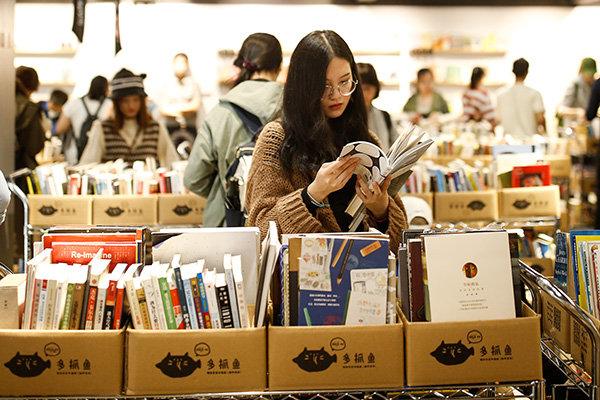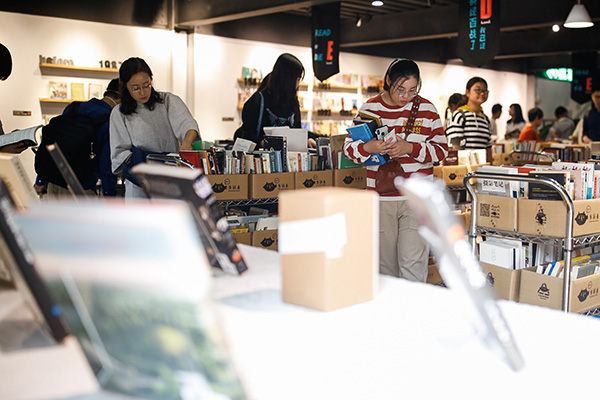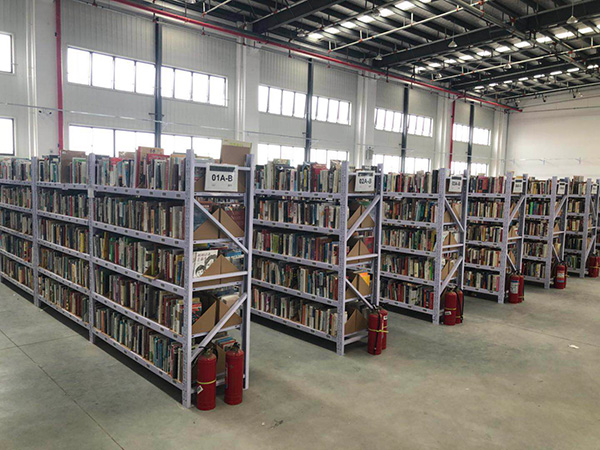

New meets old - or at least slightly used - as trading used books online becomes all the rage
Shen Bing's first foray into secondhand book buying turned out to be a revelation. The book she bought, Tengxun Zhuan (The History of Tencent), was not only in good order, to her it seemed almost brand-new. In addition it had been autographed by the author and it cost her a little less than 18 yuan ($2.6), 30 percent of its original price.
Shen bought the book from Duo Zhua Yu, or Deja Vu, an online secondhand bookshop that buys secondhand books at between 20 percent and 40 percent of their original price and sells them at between 30 percent and 55 percent of their original price.

Second-hand bookshop is a treasure trove.[Photo/China Daily]
Buying used books from the store has brought more unexpected bonuses to Shen: small mementos it often sends her when it dispatches books to her. Once she bought a novel by the Japanese author Keigo Higashino and received a message sent via the mini-program from its previous owner saying the story was fascinating and that she hoped she would enjoy it, she says.
"That message gave me a very warm feeling, and because of it I read the book more attentively than I would have otherwise, trying not to miss any of the detail."
However, for Shen, 27, a clerk with the Bank of China, the most appealing feature is that these books are so cheap. Since September last year she has bought more than 500 books from Duo Zhua Yu mostly at a discount of 60 percent, spending a total of 7,000 yuan. She has also sold more than 200 books to the store at a discount of about 80 percent.
"I always buy social science books there. The most popular ones are hard to find, and sometimes when I'm finished reading I sell them back to the store."
Duo Zhua Yu was founded in January 2017 and had soon won a large following of people like Shen, buying and selling their books to it and helping to turn the online market for secondhand books into a very prosperous one.
During the recent Singles Day online shopping spree, when tens of thousands of sellers cut prices to attract customers, Duo Zhua Yu said it would pay more for the books it bought for 24 hours and in doing so its inventory swelled with the addition of 100,000 books, which it says is five times the number of books it usually buys each day.
Wei Ying, 32, founder of Duo Zhua Yu and a former employee of the e-commerce company Alibaba, says the idea of opening an online secondhand bookstore arose from her experience selling old books and CDs when she was a university student in Beijing.
At the time she was addicted to reading books and watching movies, she says, but soon realized she could not possibly afford all the books and CDs she was keen on, so she began to sell her old ones to buy new ones.
Wei set up a stall on the campus of the Communication University of China, selling her wares a little below the original price. She sold some popular CDs at the original purchase price, she says, giving her a sense of achievement.

Second-hand bookshop is a treasure trove.[Photo/China Daily]
"Many books were too popular to borrow from the library," Wei says. "By reselling them after reading them I could read books at leisure very cheaply. The experience showed me that if we treat durable goods properly, everyone can use them without having to pay too much.
The dream of running a secondhand shop thus took root in Wei's mind, and in January last year she quit Alibaba, starting her online secondhand bookshop.
Her business started from groups in the social media app WeChat and she later set up a WeChat official account, with a mini-program to run the business. In March last year Wei had 5,000 books stored in her house in Wangjing, northeastern Beijing. After a year's growth, the warehouse she rented in a Beijing suburb had more than 20,000 books.
Continuing growth forced her to move twice as she sought more space to store all the secondhand books she received, once to Langfang in Hebei province and again to Tianjin. In July there were over 700,000 books in her 7,000-square-meter warehouse in Tianjin, Wei says.
"I had never imagined we could grow so quickly."
Duo Zhua Yu now sells about as many books as it buys each day, about 20,000, and its customer base has grown to more than 100,000 people, she says.
The online shop's success is built on what seems to be a changing attitude to ownership by which younger Chinese are giving greater emphasis to the right to use things rather than the right to possess them, which means they are more likely to pass on used items to others. Other manifestations of that are rental bicycles and rental clothing.

The online shop's success is built on what seems to be a changing attitude to ownership by which younger Chinese are giving greater emphasis to the right to use things rather than the right to possess them, which means they are more likely to pass on used items to others.[Photo/China Daily]
Moreover, better quality bookbinding gives books more durability, making them amenable to being circulated among different buyers. And due to the improvement of technology, it is possible for the WeChat-based mini-program to easily distinguish different books by scanning its ISBN code to show the price.
Other online secondhand book stores include Zhuan Zhuan (Exchange) and Manyou Jing (Wandering Whale), which have official accounts or mini-programs on WeChat.
Zhang Ningyu, 36, an editor with the social-media platform Sina Weibo, says she sold more than 100 books to these secondhand bookstores in June when she was moving from one side of Beijing to the other.
"I'd read all the books so I didn't need them. The online secondhand bookstore was a good solution."
And of course her windfall from the old books helped her buy yet more, she says.
Zhang, who has a daughter in kindergarten, says that after buying books for herself and finding those on Duo Zhua Yu and Manyou Jing were clean, she began to buy storybooks for her daughter.
"I appreciate what they do in cleaning and disinfecting each book, which I find reassuring."
Wei says: "With what we do we aim to give each book maximum value and we hope more and more used books will come into circulation, providing more choices for people who love reading. And with low prices we want to engage the interest of more people in reading books."
A report on China's book market last year published by Beijing Open Book Co Ltd, a provider of data and information for the publishing industry, said the book market in China had turnover of 803,200 million yuan last year, 14.5 percent more than in 2016. The increase indicates that the book market in China is still growing.
Hu Xiaoming, 29, who runs a book shop in Tianjin and has been buying secondhand books for several years, says he enjoys wandering around old book stalls along the street and coming across good old books that he likes. With the growing business of online bookstores, he began to buy secondhand books online.
"It's convenient and the books are clean, which people appreciate," he says.
Hu suggests that these days people are overburdened with material possessions, which helps make recycling an attractive proposition.
Many online bookstores buy only books published this century, Hu says, a policy he disagrees with. Since many old books owned by older people are as valuable as more recently published works, he says, online secondhand book dealers should be more open to books published earlier.
"I once met this 70 year old selling his books to street waste recycling stations. He bemoaned the fact that because his children did not want them and he could no longer read them, he had no choice. I wish online bookstores would buy older books so more people could make better use of them."
Though online secondhand book stores provide plenty of convenience and seem to have bright prospects, more conventional, physical bookshops, are still showing their resilience. During the National Day holiday in October, Duo Zhua Yu rented a shop in Beijing for a week, its first offline store, and says it sold 180,000 secondhand books in just six days.
Hu, who has managed bookshops for 10 years, says that while the internet is a great sales channel, there is nothing quite like stumbling on a good book in a physical shop.
"You have to touch the book to ensure it's the one you want, and it's important to start reading it as soon as you have paid for it."
 Fire brigade in Shanghai holds group wedding
Fire brigade in Shanghai holds group wedding Tourists enjoy ice sculptures in Datan Town, north China
Tourists enjoy ice sculptures in Datan Town, north China Sunset scenery of Dayan Pagoda in Xi'an
Sunset scenery of Dayan Pagoda in Xi'an Tourists have fun at scenic spot in Nanlong Town, NW China
Tourists have fun at scenic spot in Nanlong Town, NW China Harbin attracts tourists by making best use of ice in winter
Harbin attracts tourists by making best use of ice in winter In pics: FIS Alpine Ski Women's World Cup Slalom
In pics: FIS Alpine Ski Women's World Cup Slalom Black-necked cranes rest at reservoir in Lhunzhub County, Lhasa
Black-necked cranes rest at reservoir in Lhunzhub County, Lhasa China's FAST telescope will be available to foreign scientists in April
China's FAST telescope will be available to foreign scientists in April "She power" plays indispensable role in poverty alleviation
"She power" plays indispensable role in poverty alleviation Top 10 world news events of People's Daily in 2020
Top 10 world news events of People's Daily in 2020 Top 10 China news events of People's Daily in 2020
Top 10 China news events of People's Daily in 2020 Top 10 media buzzwords of 2020
Top 10 media buzzwords of 2020 Year-ender:10 major tourism stories of 2020
Year-ender:10 major tourism stories of 2020 No interference in Venezuelan issues
No interference in Venezuelan issues
 Biz prepares for trade spat
Biz prepares for trade spat
 Broadcasting Continent
Broadcasting Continent Australia wins Chinese CEOs as US loses
Australia wins Chinese CEOs as US loses